Sports Drink Myths Busted
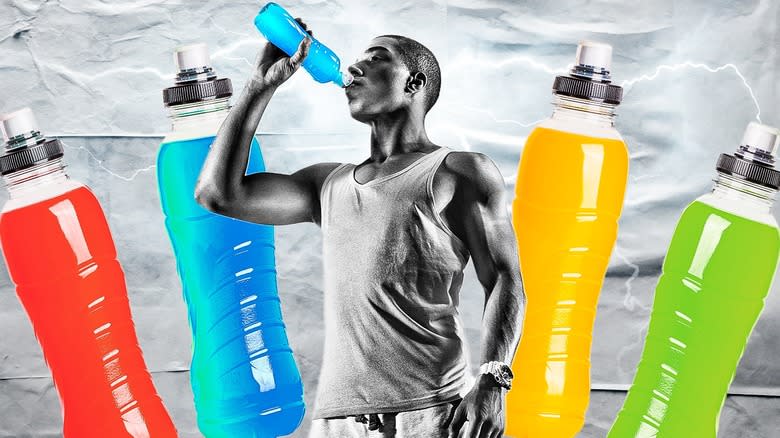
Sports drink companies sell consumers a dream. They have convinced the world that a bottle of their product can work wonders for the body and provide numerous health benefits. Many consumers believe that sports drinks keep you hydrated, boost the electrolytes in your body, improve your athletic performance, and contain tons of healthy ingredients. With over a billion cases of sports drinks being sold every single year in the United States alone, it's clear that a huge part of the population is buying into these claims.
The dirty little secret that people don't realize is that many of the unbelievable benefits of drinking sports drinks are actually complete myths. While sports drinks can have positive effects in certain scenarios, there are still a lot of inaccurate notions about what they do for you. Mashed interviewed a nutrition expert to debunk several widely-held myths about sports hydration. Before you go chugging one of these colorful beverages, check out the top seven false facts about sports drinks and why they're completely untrue.
Read more: Diet Sodas, Ranked Worst To Best
Myth: Sports Drinks Keep You More Hydrated Than Water
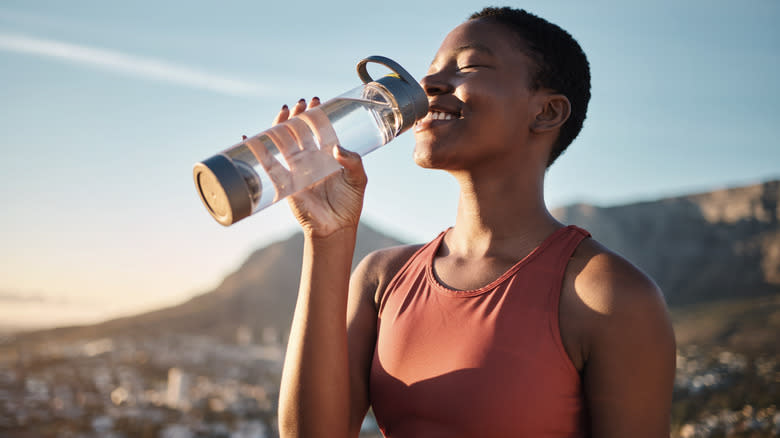
One of the biggest selling points of sports drinks is that they have the power to hydrate the body to an extreme degree, even more than water can. Mashed spoke with Floris Wardenaar, an assistant professor of nutrition at the Arizona State University College of Health Solutions, to gain more insight into the perception that sports drinks are more hydrating than water. He explained that sports drinks can hydrate faster than water and even increase water retention in certain circumstances. However, they're not necessarily the best alternative to good old water. According to Floris, "Often it is more important to just drink enough water, which a lot of people could improve on."
Many of the top sports drink brands can even dehydrate drinkers as they consume them because they are hypertonic beverages. These types of drinks have a very high percentage of sugar and salt in them, leading the consumer to feel even more thirsty than before they drank them. In reality, water is almost always the best option for hydration and should be the go-to for keeping your thirst quenched unless you are participating in an extremely challenging physical activity.
Myth: Sports Drinks Make You Perform Better At Athletic Activities
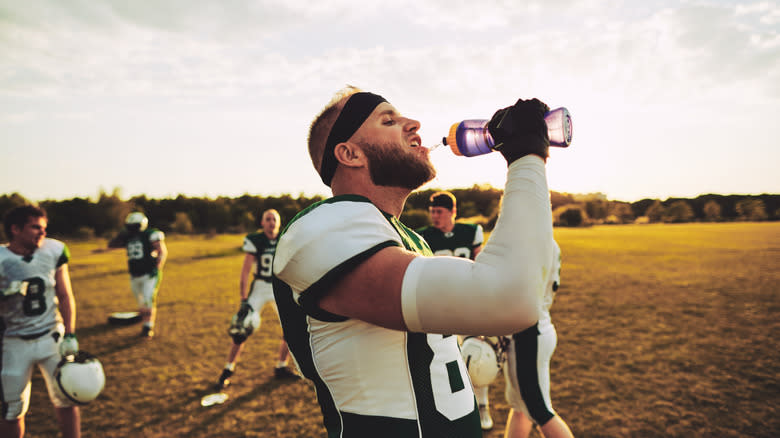
Sports drinks are commonly advertised by the most famous athletes in the world, which makes it seem like these beverages are the key to performing your best out on the field or court. The truth is that there isn't any research out there supporting the claim that drinking sports drinks actually makes you better at sports. While professional athletes can occasionally benefit from the boost that a sports drink provides, the standard adult just doesn't need it. As dietician Nancy Clark explains, "The average person is not working out hard enough to need the rapid refueling these drinks offer,".
These beverages may not always hinder your athletic performance, but it isn't actually helping you be better. Not to mention that many of the benefits of sports drinks can be achieved by just drinking regular water. Plus, regular water doesn't have the negative side effects that can come from ingesting too many sports drinks, such as weight gain and diabetes.
Myth: Sports Drinks Provide Electrolytes To Your Body
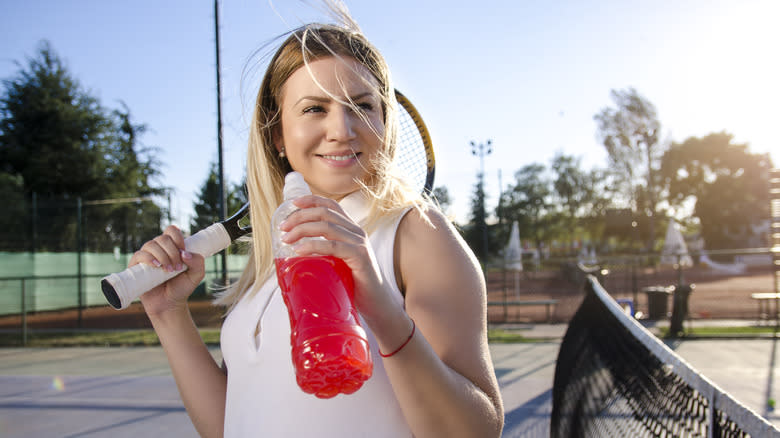
One of the most well-known sports drinks claims is that they replenish your body's electrolytes. These important minerals often seep from the body as you sweat during strenuous exercise, which is why it's such a convincing myth. It is technically true that many brands of sports drinks contain some of the electrolyte minerals, like magnesium, calcium, and potassium. However, the big one that sports drinks pump into their product is a truckload of sodium.
For example, Gatorade's Cherry Glacier flavor has 10 teaspoons of sugar and a whopping 330 milligram of sodium per serving, which is more than a medium order of french fries from McDonald's. Imagine if everyone thought that athletes should throw back a cup of salty fast-food fries after their workouts. While it's accurate that sodium is one of the body's most important electrolytes, that doesn't mean that drinking liquid salt is going to do anything positive for you after playing sports.
The 250 milligram of sodium that the average sports drink contains is actually a full 10% of a human's daily recommended sodium intake in a single drink. The myth that sports drinks give you electrolytes is a tricky one in the end because it is kind of true, but it's also misleading because it makes people think that consuming these beverages on a regular basis is good for you. However, it can be harmful to intake excessive amounts of sodium, especially for non-athletes.
Myth: Sports Drinks Are Healthy For You
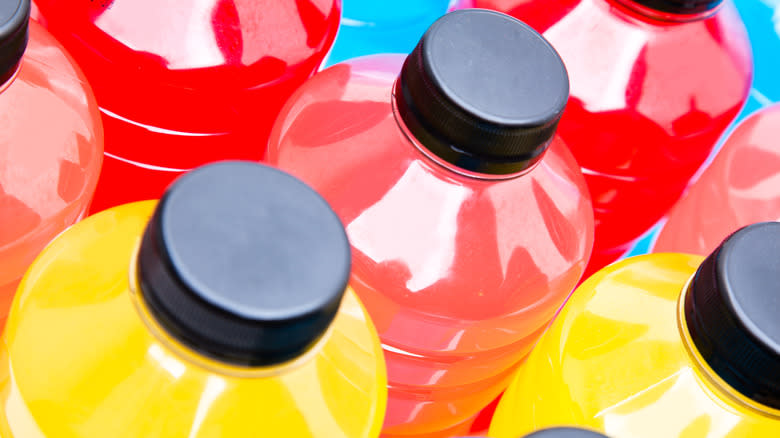
Many people think that drinking a sports drink is giving their body the stuff it needs to be healthy. Sports drinks provide positives in certain scenarios, but for most people, these products aren't even close to healthy. Floris Wardenaar explained to Mashed, "Because of their potential, many people have started to identify them as healthy choices, while that is not the case for most individuals because they often come with a lot of sugar."
The standard 32-ounce sports drink can have up to 19 teaspoons of sugar in it, which is around six times the daily recommended amount for children and teenagers. That is even more sugar than many candies like M&Ms, Sour Patch Kids, and KitKats. There are also a bunch of other ingredients in top sports drink brands that can be detrimental to your health, such as high fructose corn syrup and artificial flavors. Per the Harvard T.H. Chan School of Public Health, drinking sports drinks too often can easily lead to issues such as type 2 diabetes, cavities, and cardiovascular disease.
Myth: Sports Drinks Will Prevent Cramps For Athletes

It's a total drag to be in the middle of a workout session only to get bogged down by a painful cramp halfway through and many people believe that drinking sports drinks will prevent this situation from happening. Unfortunately, though, sports drinks most likely won't help you from avoiding the unpleasant experience of cramps. One study from the Journal of Athletic Training found that 69% of participants developed leg cramps after intense physical activity, even if they drank an electrolyte sports drink beforehand.
While drinking a sports drink won't save you from getting cramps during intense activity, there are still many remedies that may prevent the condition. A bunch of professional athletes swear by drinking pickle juice to prevent or cure a case of cramps. There are several other more natural and effective sports drink alternatives, such as eating bananas, avocados, and melons or drinking tomato juice.
Myth: Sports Drinks Don't Have Any Sugar In Them
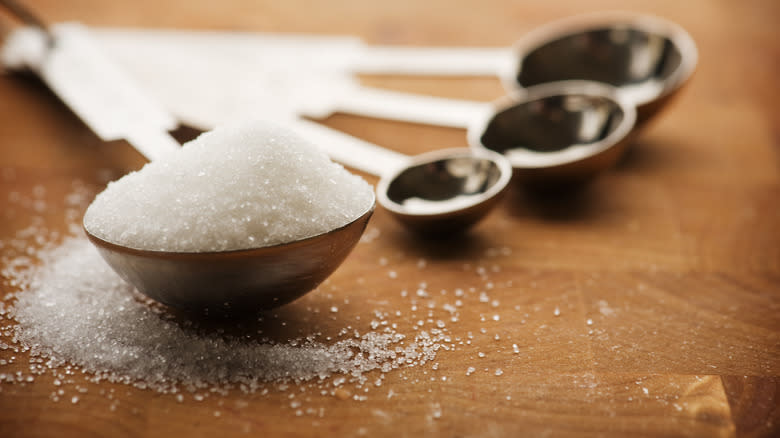
Most people would never put soda and sports drinks in the same category. Yet sports drinks are only a hop, skip, and a jump away from being sugar-packed, unhealthy sodas. The average sports drink contains around ⅔ the amount of sugar that's in a standard soda, which is a little too close for comfort for a drink that's supposed to be for athletes. Plus, sports drinks come with the additional problem of containing a ridiculous amount of salt.
Mary Story, a researcher from the University of Minnesota, has argued that the increased consumption of these sugary sports drinks is contributing greatly to America's obesity problem (via CBS). The high sugar content in sports drinks can be even more risky for children because their developing bodies are only recommended to intake 25 grams of sugar per day — the average sports drink has anywhere from 56 to 76 grams of sugar in it.
Myth: Sports Drinks Don't Contain Unhealthy Ingredients
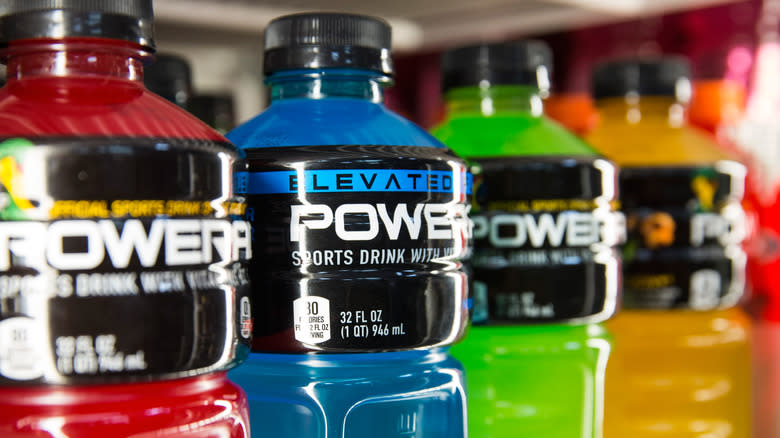
Since sports drinks are so heavily associated with athletics and exercise, most people assume that there is absolutely no way that they could contain unhealthy ingredientss. The reality is that almost everything in some brands of sports drinks is bad for you. As previously discussed, there are heaps of salt and sugar in sports drinks, but that's only the beginning of the unhealthy ingredients.
Besides the salt and sugar, most major brands of sports drinks put things like high-fructose corn syrup, along with additional artificial sweeteners and flavors. That bright blue or red color that makes sports drinks stand out on the shelf isn't natural either. It comes from artificial dyes like red #40 and yellow #5. These types of dye have been known to be carcinogenic and even possibly cause hypersensitivity reactions. When all is said and done, there are far more bad ingredients in many sports drinks than healthy ones.
Read the original article on Mashed

